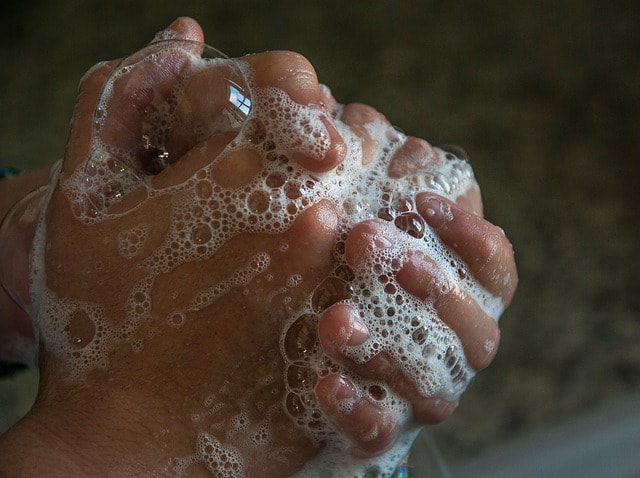Keeping eyes free and clear of infection-causing organisms is important. Speaking with your college-bound child about the following suggestions to prevent an eye infection can keep his or her eyes safe at school this year. 1. Don’t Share Makeup
It may be fun to share the latest mascara or eyeliner. But sharing makeup can lead to an eye infection such as herpes keratitis. Our eyelashes naturally have bacteria on them. When applying mascara, we contaminate the brush. Even if neither person sharing makeup has an eye infection, bacteria are still communicated, which can lead to an eye infection.
For this reason, it’s also a good idea to throw away old eye makeup after several months. According to the University of Rochester Medical Center, bacteria can build up over time on eye makeup, which increases the chances of developing an infection. If the makeup is several months old, it’s best to toss it out and start fresh. 2. Wash Hands Frequently
Frequent hand washing is one of the best things your college-aged child can do to prevent an eye infection at school. Most of us touch our eyes without even thinking about it. Rubbing eyes with hands contaminated with bacteria or a virus can easily lead to an eye infection like conjunctivitis.
Hand washing is especially important before your child removes or puts in his or her contact lenses. Hand washing may seem like a no-brainer, but many people don’t do it correctly. A little parental reminder on proper hand washing never hurts. 3. Don't Swim or Shower with Contact Lenses
Swimming is a great exercise for your child, but according to the U.S. Food and Drug Administration (FDA), contact lenses should not be exposed to water. Water from rivers, lakes, and the ocean can contain many types of bacteria and viruses that may lead to an eye infection. Even the chlorine in swimming pools and hot tubs may not kill all pathogens. So, before your child takes a dip at school this year, make sure he or she knows to remove his or her contact lenses.
Showering with contact lenses can also lead to eye infections. In fact, parasites in the water can lead to serious eye infections like Acanthamoeba keratitis. Advise your child to remove his or her contact lenses before every shower. 4. Store and Clean Contact Lenses Properly
Properly storing and cleaning contacts is one way to decrease the chances of developing an infection. Make sure you child understands that he or she should not wear contact lenses past the recommended replacement schedule.
Properly cleaning contact lenses is essential to preventing an infection. After washing his or her hands, your child should prepare the lens case by adding fresh solution. During cleaning, the American Academy of Ophthalmology recommends rubbing the contact lenses with a finger. The lenses should then be rinsed with contact solution before soaking them. Dumping old solution is also important. Don’t just add a little more to top it off. Encourage your child to use fresh contact solution every day. Just as important, make sure your child knows never to substitute tap water for contact solution. Tap water can contain parasites and bacteria, which can contaminate the eye and lead to serious infection, as we discussed above. Finally, have your child replace his or her lens case every couple of months. Pathogens can build up in the lens case over time. Here is a video series that can help your child learn about proper contact lens care and safety: What If My Child Does Get an Eye Infection at School?
If your child does get an eye infection, make sure he or she is following his or her doctor's instructions, using any medications that have been prescribed correctly, and taking precautions so as not to spread the infection or reinfect him or herself. To prevent spreading the infection, tell your child not to wash his or her hands regularly and especially any time he or she touches his or her eye and not to share any personal items, including towels, eye drops, and eye makeup, with anyone.
To prevent a reinfection, instruct your child to throw away any eye makeup and eye drops used while infected. He or she should also wash any pillowcases and towels used while infected. Eyeglasses and eyeglass cases should also be cleaned properly. Hopefully, if your child takes the above precautions, he or she will remain infection free this school year. But remember, some eye infections can be serious and potentially vision threatening. If your child suspects or has symptoms of an eye infection, such as pain, redness, itching, light sensitivity, sensation of a foreign body in the eye, or discharge, it’s best to err on the side of caution. Have his or her eyes examined by an eye care professional right away. If you have any questions about eye infections or protecting your child’s eyes from infection this year at school, please do not hesitate to contact us. We are happy to answer any of your questions. If you think your child may have an eye infection or is displaying any symptoms of one, please call us at 508-746-8600 right away to schedule an appointment with one of our eye doctors. Be sure to join us for our next post for Children’s Eye Health & Safety Month, Common Eye Problems Amongst College Students. Comments are closed.
|
EYE HEALTH BLOGCategories
All
Archives
July 2024
|
|
Kadrmas Eye Care New England
55 Commerce Way, Plymouth, MA 02360
14 Tobey Road, Wareham, MA 02571 133 Falmouth Road (Rt 28), Mashpee, MA 02649 |
Phone Number:
1-508-746-8600 Hours: Monday through Friday — 8 AM – 4:30 PM |


 RSS Feed
RSS Feed
